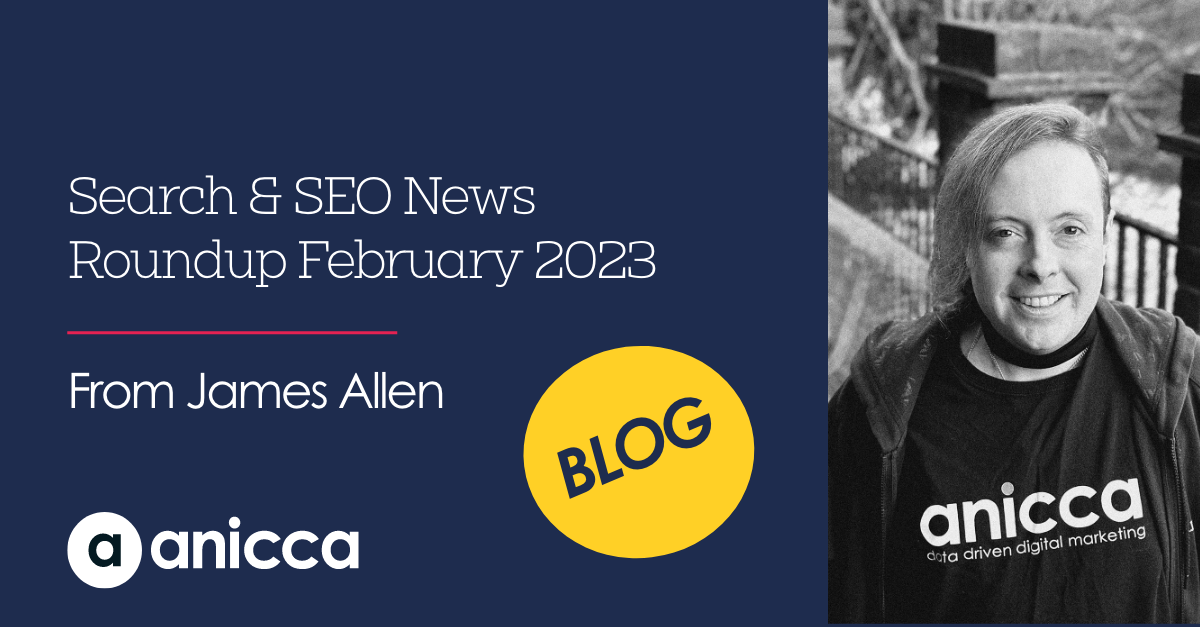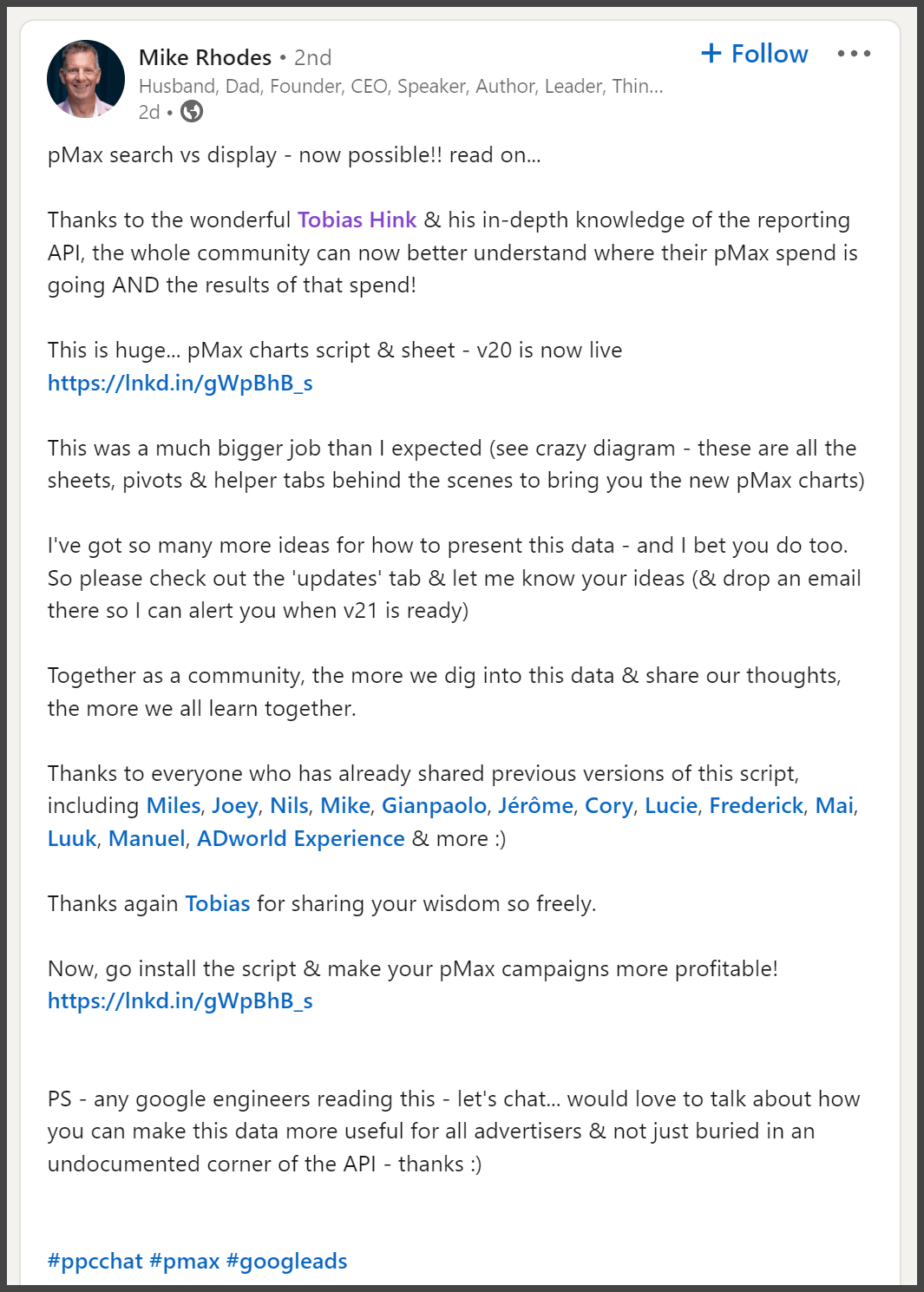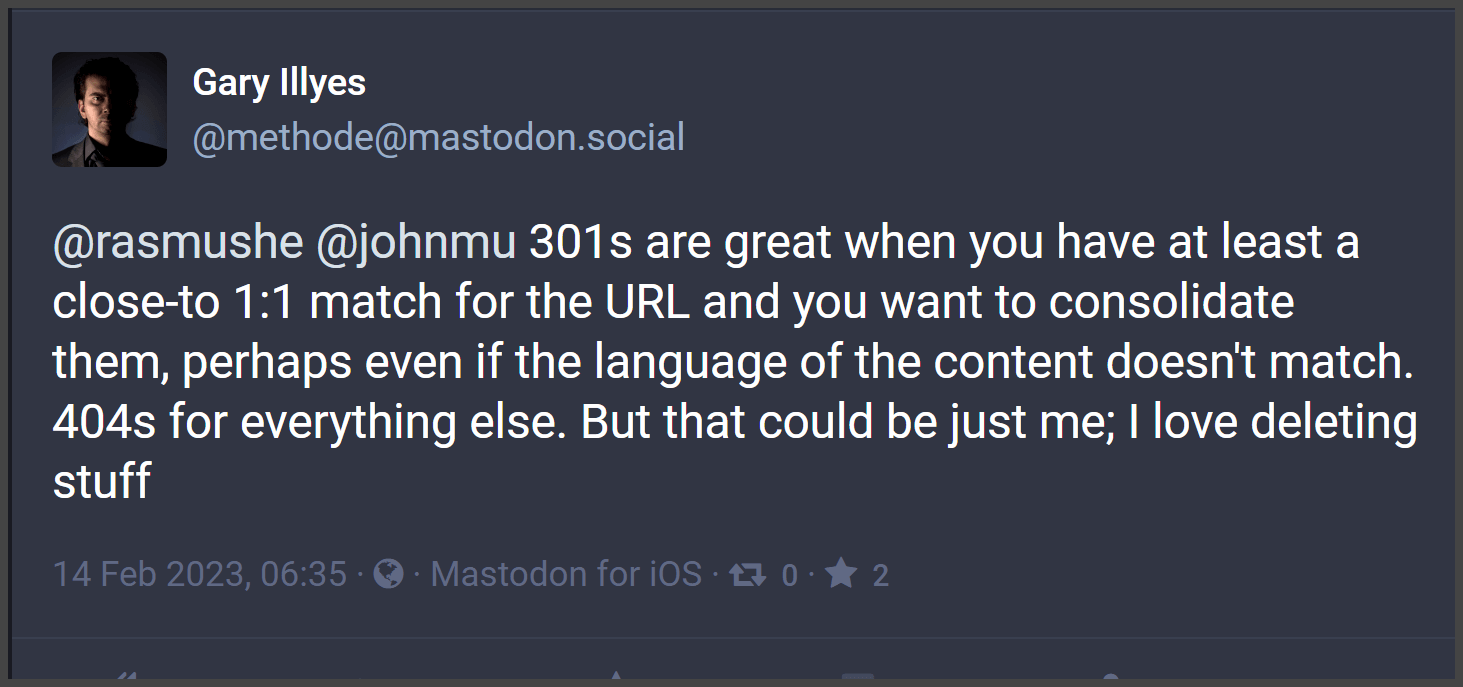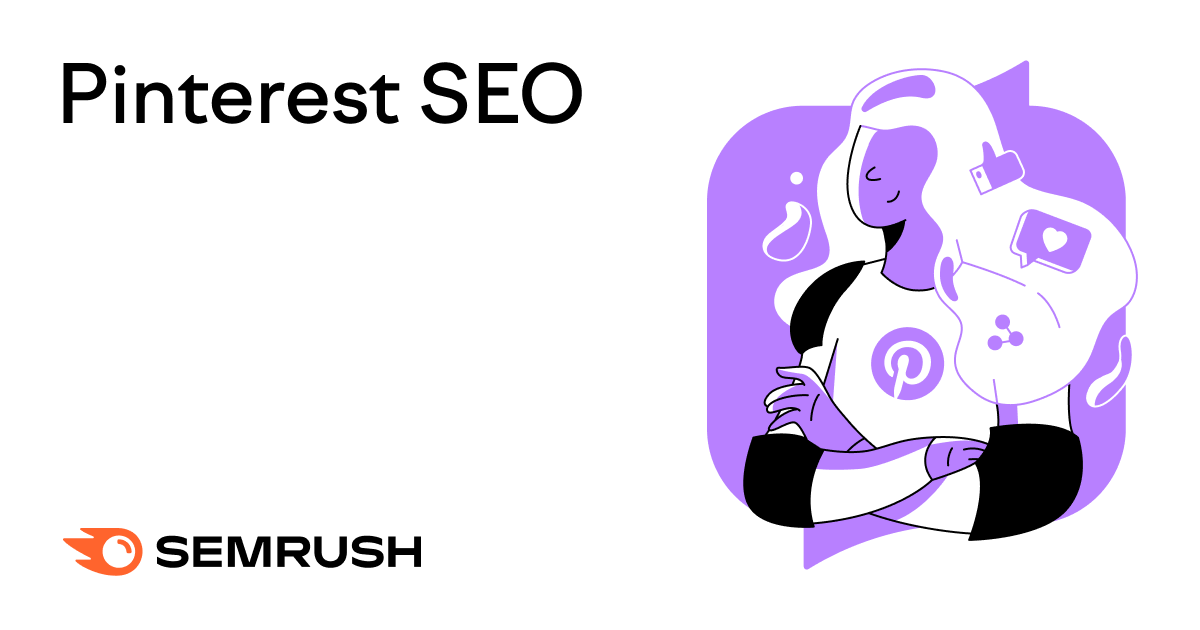

What’s new in search this February? New techniques for Performance Max optimisation, the arms race for AI-assisted search and 301 redirect insights.
During February 2023, these are some of the highlights so far:
- Performance Max for Lead Generation
- 301 Redirects Work Best for Close 1:1 Content Matches
- Publishers Express Concern Regarding AI-Powered Search
- Google to Remove TTI from Lighthouse & Delegate Weighting to CLS
- Google Enhances Contextual Translations via AI
- Bing, Edge and ChatGPT: Microsoft and Open AI Work to Evolve Search
- Google Overhauls their Canonicalization Documentation
Read on for our take on recent events in search.
Performance Max for Lead Generation
Posted February 14th on Search Engine Land
This is more of a guide revolving around new Google Ads technologies, vs a traditional news post. We thought we would cover this as the post contains some very interesting insights, and it’s also partially related to a scripting library which has recently been released by Tobias Hink.
The post from Search Engine Land impresses the importance of connecting offline conversion data for Performance Max campaigns which revolve around lead generation. According to Menachem Ani of Search Engine Land, Performance Max ads campaigns revolving around lead generation often fail as Google qualify a number of spam submissions as genuine leads.
This leads to a negative feedback loop, where the Performance Max engine convinces itself that spam leads are genuine, and thus targets more and more spammers. But this can be mitigated by connecting offline conversion data (e.g: from a CRM system like Salesforce).
Menachem writes:
“What helps most in our experience is implementing an integration with a customer relationship management (CRM) tool, such as Salesforce or HubSpot.
With this, we can see offline conversion data for leads generated through Google Ads.
Say we’re measuring form submissions, chats, phone calls – any type of contact – and the client gets 10 leads but only two were good. We want the system to know which two out of the 10.
And over time, Google starts to see that the good ones come from certain geos or share certain audience signals.
If you can upload offline conversions in the time it takes to go from lead to actual revenue, you want to feed that data into the system. But if you have a long sales cycle, we recommend scoring the lead (this is data you have right away).”
This really demonstrates the importance of connecting offline conversion data, specifically for lead-gen based Performance Max ads campaigns.
Separately, Mike Rhodes has posted some awesome scripts to help with Performance Max optimisation (though the resources were created by Tobias Hink):

So, what does the script do? From the GitHub page:
“This is a script to add to a single google ads account to get more visibility over any performance max campaigns running”
Mike Rhodes writes that this script allows marketers to “better understand where their pMax spend is going AND the results of that spend”.
Main takeaway: There’s a lot of buzz surrounding Performance Max optimisation right now. It has some pitfalls (especially for lead-gen campaigns) but there are technologies and scripts which can help to mitigate.
301 Redirects Work Best for Close 1:1 Content Matches
Posted February 14th on Search Engine Roundtable
This post revolves around a Mastodon update from Gary Illyes:

Gary Illyes is a well-respected web trends analyst at Google. His comments reveal that 301 redirects can pass SEO authority, in some situations where the language of each address (redirect origin and redirect destination) doesn’t match.
Imagine that you have a page on your website promoting a product or service. Suddenly, that product or service is unable to be supplied in a certain country. For this example, let’s say the product or service can no longer be supplied in France. You could redirect the old French page, to the UK or US version of that same product or service. Some amount of SEO authority would still be transferred.
Obviously, if you are leaving pages live across multiple languages, the correct recommendation is hreflang tags rather than redirects. Even so, it’s nice to know that in niche situations, there’s a chance to retain the SEO authority of ‘end-of-life’ foreign-language pages.
Main takeaway: Whilst this post mainly comments on the niche applications of international redirects, there’s a larger point to take away. If URLs with a close 1:1 content match are effective for redirects, then highly dissimilar URLs are unlikely to allow much SEO authority transfer. This is especially important if you’re considering a site redesign. Don’t get rid of too much content. By all means, nest it more effectively or demote some content within the UX. If you delete large chunks of content from your site, that will then mean that the larger volume of old addresses, won’t be very ‘similar’ to the smaller volume of new addresses. Such moves often result in SEO traffic loss. At the least, have your content professionally audited first before you choose what to remove.
Publishers Express Concern Regarding AI-Powered Search
Posted February 13th on Search Engine Roundtable
Google were taking their time to introduce AI-assisted search, until Microsoft linked arms with OpenAI and ChatGPT came to Bing. Once that happened, the gloves were off and Google revealed Bard in short order.
Some years ago, Google released knowledge graph / knowledge panels, where Google’s search engine would attempt to answer queries directly within results pages, without users needing to click on links. At that time, there was a lot of concern regarding those new features. If users would no longer be clicking on ads and organic results, would Google cease to be a major traffic supplier? Where would websites get their traffic from, how would Google continue to profit from ad clicks?
In the end, many of these fears proved to be unfounded. Of course, Google did not want to cut off their own ad revenue from PPC (Pay Per Click) advertising. Knowledge panels did change search, but not in such a drastic way that Google stopped supplying organic traffic to websites.
Now with the introduction of Bard, similar fears are being raised again. If the search engine answers more queries directly and directs fewer users to external websites, how will that affect the web and web-advertising?
Barry Schwartz (writing for Search Engine Roundtable) comments:
“To catch you all up, Google announced Bard which showed screenshots of a ChatGPT like interface in search which had zero links or citations to publishers. The Microsoft Bing AI announcement was much more thought-out and had links to publishers, ads and so on.
But what the big publishers are concerned about is that there will be less of a need for searchers to click on those links than they had in the past. It is a similar concern we had with featured snippets and then the head of search at Google, Amit Signhal, said publishers are the corkscrew and Google is the Swiss army knife after Danny Sullivan called Google the biggest scraper and shared the concern publishers have about searchers not needing the 10 blue links anymore. But AI chat takes this to a whole new level, a whole new level.
This just reminds me of all the featured snippet debate from almost a decade ago.
Looking back, SEOs would most rather prefer to have a featured snippet than not. Google even said they result in more traffic and not less but refuse to release data to publishers proving that. It is the whole zero click debate that Google disputes without any evidence.
None of this is new for most of the readers here, but to hear big publishers, big content creators be really concerned about this, is interesting and exciting.”
We largely agree with Barry’s analysis. With the information we have so far, there’s nothing to conclusively prove that Google’s Bard will lead to a dystopian search landscape, where Google refuses to share any of its traffic. In actual fact, whilst Google primarily operates a Pay Per Click advertising model, it wouldn’t be in Google’s best interests to stop sharing traffic.
The unknown variable here is Microsoft, as they deploy ChatGPT-powered Bing. Bing has a much smaller search market share than Google has. Whilst Google may have to drag their feet due to the impact that fuller integration could have on their PPC advertising revenue model… Microsoft aren’t in that same situation. Whilst Bing’s revenue-generating model is similar to Google’s, the overall profit from PPC ads listed on Bing is far lower. Microsoft could choose to sacrifice more of their Bing advertising profits, in order to create a more powerful search engine which increases Bing’s usage / search market share.
Main takeaway: The fight for the next generation of search is on, with Google in one corner and Microsoft Bing in the other. Microsoft might seem like the underdog, but they adopted AI-assisted search earlier and may be able to more able to fully integrate its technologies. Publishers express concern at these changes, as they have in the past. Search will adapt and so will publishers.
Google to Remove TTI from Lighthouse & Delegate Weighting to CLS
Posted February 10th on Search Engine Land
Google are removing the TTI (Time to Interactive) metric from Lighthouse, signifying that it is relatively unimportant for page-speed assessments and related ranking movements. This doesn’t affect the Core Web Vitals. TTI was a lab metric and has never been a true Core Web Vital. The true Core Web Vitals are based on field data.
There’s been a lot of buzz in terms of whether this will impact ranking results on Google. Once TTI is removed, any small sway it did have over rankings will be re-allocated to CLS (Cumulative Layout Shift). CLS is a full Core Web Vital, and has been for some years.
However, it’s important to keep in mind that the impact of Core Web Vitals / page-speed ratings on Google’s results, is only slight. If two pages have relatively equal SEO authority, relevance and content depth / quality, the one which loads faster might take the result. In reality, this change from Google is unlikely to cause significant shifts within Google’s ranking results.
Barry Schwartz (writing for Search Engine Land) comments:
“Does it matter for ranking? Technically, this might have zero impact on overall rankings in Google Search. Core Web Vitals is a minimal ranking factor in general and the current Core Web Vitals includes largest contentful paint (LCP), first input delay (FID), and cumulative layout shift (CLS). TTI is not included.”
Main takeaway: An interesting change from Google, but it only serves to confirm their page-speed ranking agenda (to use field data / Core Web Vitals more, and lab data less). In reality this won’t change much.
Google Enhances Contextual Translations via AI
Posted February 8th on Search Engine Journal
More news with combined insights from the fields of search and AI. Matt G. Southern of Search Engine Journal writes a summary:
“Google Translate has added AI-powered features, including contextual translations that provide helpful and accurate translations based on context and intent.
The app has received a fresh new design on Android, with easier access to voice input, conversation translation, and Lens camera translation, and new gestures for easier navigation.
Image translation has been expanded with advanced machine learning, allowing the app to translate complex images and blend translated text into them for a more natural look.”
It’s nice to see Google Translate getting some attention. Although it’s nice to hear about the new design and UX improvements, that’s not the real news. The real news is that Google have supplemented Google Translate with AI-assistive technologies.
Google Translate was revolutionary when it was first released back in 2006. By 2015, users were regularly running into and experiencing Google Translates limitations. Essentially, different languages don’t always match up 1:1 for words and meanings. A word that has a single meaning in English, may have multiple meanings in other languages – the reverse can also be true. In other words, context is key.
Whilst Google Translate has always been strong at translating content with high contextual linguistic compatibility, Google Translate struggles with contextual ambiguity. Obviously, this is an area of strength for AI, so it’s easy to see how these technologies will fit together. Fewer embarrassing ‘mistranslated’ phrases.
Main takeaway: Not something which is massively likely to impact Google’s main ranking results. On the other hand, we are sure that end-users will find Google’s AI-assisted Google Translate much more useful. Maybe we will soon see a universal translator device, like from Star Trek!
Bing, Edge and ChatGPT: Microsoft and Open AI Work to Evolve Search
Posted February 7th on the Microsoft Blog
Now that the arms race for AI-assisted search is on, it’s not surprising to see Microsoft integrating OpenAI’s ChatGPT within their Bing search engine (and Edge browser) at speed. Whilst users always used to moan and complain when Internet Explorer was the only available web-browser, Microsoft Edge is actually perfectly competent and capable. With powerful AI integrations, it might even threaten Google’s Chrome browser.
The post from Microsoft states:
“Today, we’re launching an all new, AI-powered Bing search engine and Edge browser, available in preview now at Bing.com, to deliver better search, more complete answers, a new chat experience and the ability to generate content. We think of these tools as an AI copilot for the web.
“AI will fundamentally change every software category, starting with the largest category of all – search,” said Satya Nadella, Chairman and CEO, Microsoft. “Today, we’re launching Bing and Edge powered by AI copilot and chat, to help people get more from search and the web.”
There are 10 billion search queries a day, but we estimate half of them go unanswered. That’s because people are using search to do things it wasn’t originally designed to do. It’s great for finding a website, but for more complex questions or tasks too often it falls short.”
The post then goes on to reveal how new AI integrations will help to overcome the traditional limitations of a search engine. In the future, users will be able to ask a search engine to “do things it wasn’t originally designed to do”. One thing that we have found really interesting, is that Cortana (Microsoft’s version of Siri / Hey Google) is not mentioned in this post.
Cortana had entered a wind-down process circa 2020, for example the Android app for Cortana was shut down. However, now that Microsoft has access to ChatGPT’s enormous assistive power and vast databanks, could Cortana be resuscitated? That would certainly be very exciting. Perhaps this will happen in a more subtle way, some kind of Bing assistant integration. It would be nice to see Cortana make a major comeback.
Main takeaway: Microsoft are working hard to capitalise on their head-start in the AI search race. Watching the types of disruptive integrations they craft, in order to challenge Google’s dominance, will be very interesting. Keep a close eye on Microsoft.
Google Overhauls their Canonicalization Documentation
Posted February 3rd on Search Engine Roundtable
In such revolutionary times, it’s easy to get swept up in all the AI excitement. Although these new technologies are fascinating and inspiring, for much of the search landscape it’s business as usual. Coming down from the heady highs of AI-musings, Google have overhauled their documentation for canonicalisation / canonical tags.
You can see Google’s old page for this documentation here (Wayback Machine). There are now three separate pages covering this topic:
Going back to the early and mid-2010s, it was very common for Google to simply spit out documentation with no further advice or clarification. Back then, Google was obsessed with implementation and laying down the codex-of-code for the web.
Nowadays, Google is more willing to give some hints and snippets of advice. Google continue to update their documentation in this regard. In this example, creating a section to help users “Fix canonicalization issues” is a welcome change of pace.
Main takeaway: Over time, Google is connecting more with those in SEO seats and roles. Google give more advice on practice and deployment, above and beyond their usual implementation and coding guidance.
Here at Anicca, we stay up-to-**** on all SEO, search and algorithmic developments and apply them to our clients’ campaigns. You can check out our SEO services here. Impressed with our knowledge and coverage of search? Give us a call on 0116 298 7857.



